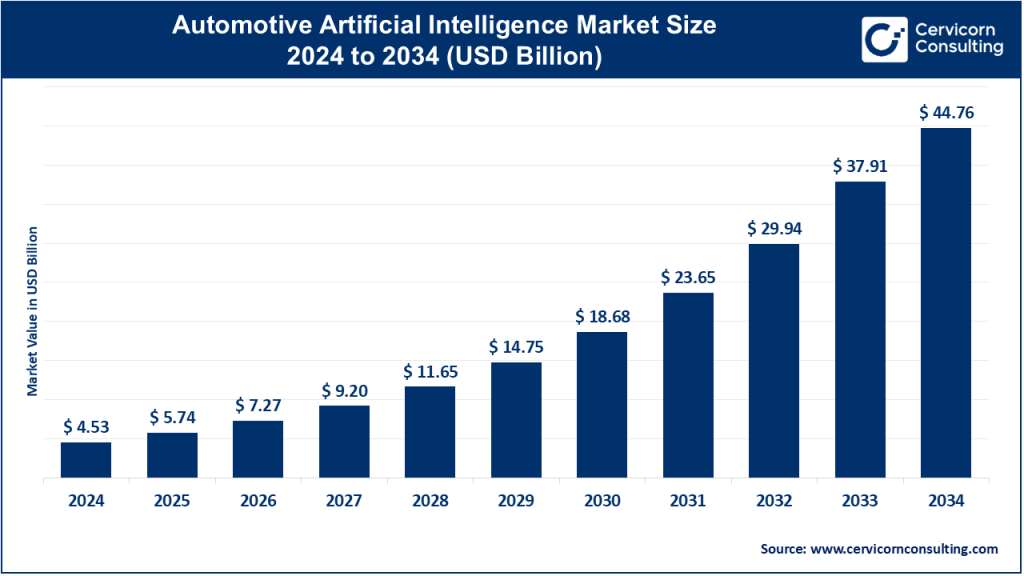What is the Automotive Artificial Intelligence (AI) Market?
The Automotive Artificial Intelligence (AI) Market encompasses the integration of advanced AI technologies into vehicles to enhance their performance, safety, efficiency, and user experience. These technologies include machine learning, natural language processing, computer vision, and robotics, which are implemented in applications such as autonomous driving, predictive maintenance, advanced driver assistance systems (ADAS), in-car virtual assistants, and fleet management systems. The market serves as the backbone for the evolution of smart mobility solutions, addressing the growing demand for connected, intelligent, and sustainable transportation systems.
Why is the Automotive Artificial Intelligence (AI) Market Important?
Automotive AI holds transformative potential for the automotive industry, enabling vehicles to operate autonomously, enhancing safety features, and providing seamless connectivity for users. It also supports environmental sustainability by optimizing fuel consumption and enabling the adoption of electric vehicles (EVs). Moreover, automotive AI is crucial for addressing challenges like traffic congestion, road safety, and personalized user experiences. As automotive ecosystems evolve, AI becomes integral to achieving competitive differentiation and operational efficiency.
Get a Free Sample: https://www.cervicornconsulting.com/sample/2327
Top Companies in the Automotive Artificial Intelligence (AI) Market
1. Waymo LLC
- Specialization: Autonomous driving solutions
- Key Focus Areas: Self-driving technology, ride-hailing services, mapping systems
- Notable Features: Proprietary Waymo Driver technology, fleet of fully autonomous vehicles
- 2024 Revenue (Approx.): $1.5 billion
- Market Share (Approx.): 15%
- Global Presence: Operations in the United States with testing in select international markets
2. Tesla, Inc.
- Specialization: Electric vehicles and autonomous driving systems
- Key Focus Areas: Full Self-Driving (FSD) software, EV production, over-the-air updates
- Notable Features: Advanced driver assistance systems (Autopilot and FSD Beta)
- 2024 Revenue (Approx.): $94 billion (automotive segment)
- Market Share (Approx.): 25%
- Global Presence: Strong foothold in North America, Europe, and Asia-Pacific
3. NVIDIA Corporation
- Specialization: AI hardware and software for automotive applications
- Key Focus Areas: AI computing platforms, autonomous driving software development
- Notable Features: NVIDIA DRIVE platform, simulation tools for autonomous vehicles
- 2024 Revenue (Approx.): $4.8 billion (automotive segment)
- Market Share (Approx.): 10%
- Global Presence: Partnerships with automakers worldwide
4. Intel Corporation
- Specialization: AI solutions and edge computing for vehicles
- Key Focus Areas: Mobileye technology, sensor fusion, mapping solutions
- Notable Features: EyeQ chip, REM (Road Experience Management)
- 2024 Revenue (Approx.): $1.6 billion (Mobileye division)
- Market Share (Approx.): 8%
- Global Presence: Extensive partnerships across Europe, North America, and Asia-Pacific
5. BMW AG
- Specialization: AI-powered luxury vehicles
- Key Focus Areas: Autonomous driving, smart personal assistants, predictive maintenance
- Notable Features: BMW iDrive, Intelligent Personal Assistant (IPA)
- 2024 Revenue (Approx.): $142 billion (total revenue, significant share attributed to AI-driven vehicles)
- Market Share (Approx.): 12%
- Global Presence: Operations spanning Europe, North America, and Asia-Pacific
Automotive Artificial Intelligence (AI) Market Leading Trends and Their Impact
- Development of Autonomous Vehicles:
- AI technologies are enabling Level 4 and Level 5 autonomy in vehicles.
- Impact: Reduces road accidents and traffic congestion while transforming urban mobility.
- Integration of AI with IoT (Internet of Things):
- Enhanced vehicle-to-everything (V2X) communication through AI algorithms.
- Impact: Improves real-time decision-making for traffic management and route optimization.
- AI in Predictive Maintenance:
- Use of AI to analyze vehicle health and predict potential failures.
- Impact: Minimizes downtime and reduces maintenance costs.
- In-Car Virtual Assistants:
- AI-powered assistants providing seamless user interaction and infotainment.
- Impact: Enhances user experience and customer satisfaction.
- AI-Driven Manufacturing:
- Utilization of AI in production lines for quality control and supply chain optimization.
- Impact: Reduces production costs and accelerates time-to-market for new vehicles.
Successful Examples of Automotive AI Around the World
- Waymo One: Waymo’s self-driving ride-hailing service in Phoenix, Arizona, operates fully autonomous vehicles, showcasing the viability of AI in real-world applications.
- Tesla Full Self-Driving (FSD) Beta: Tesla’s ongoing beta testing program demonstrates advancements in autonomous driving capabilities, gathering real-world data to refine its algorithms.
- BMW’s Intelligent Personal Assistant: A conversational AI system integrated into BMW vehicles that assists drivers with navigation, climate control, and entertainment.
- NVIDIA DRIVE: Powers autonomous vehicle development for automakers like Mercedes-Benz and Volvo, providing robust AI computing platforms.
- Mobileye’s REM Mapping: Real-time mapping technology used by various automakers to enhance autonomous driving and navigation systems.
Regional Analysis and Government Initiatives
North America
- Government Initiatives: The U.S. Department of Transportation’s AV 4.0 policy framework promotes the safe integration of autonomous vehicles. Canada’s AI strategy supports AI research and innovation in automotive applications.
- Market Characteristics: Dominance of key players like Waymo and Tesla, robust technological infrastructure, and consumer adoption of advanced vehicles.
Europe
- Government Initiatives: The European Union’s Horizon Europe program funds AI and autonomous vehicle research. Germany’s regulatory framework for Level 4 autonomous driving fosters innovation.
- Market Characteristics: Presence of luxury automakers like BMW and Audi, focus on sustainable transportation, and strong R&D investments.
Asia-Pacific
- Government Initiatives: China’s AI strategy emphasizes autonomous driving and smart transportation. Japan’s regulatory framework supports AI-driven automotive innovations.
- Market Characteristics: Rapid adoption of AI in vehicles, growing EV market, and significant investments in smart city projects.
Latin America
- Government Initiatives: Brazil’s focus on smart mobility solutions and AI research grants for automotive applications.
- Market Characteristics: Emerging market with growing adoption of connected and autonomous vehicles.
Middle East & Africa
- Government Initiatives: UAE’s smart transportation initiatives and Saudi Arabia’s Vision 2030 program promote AI in mobility.
- Market Characteristics: Increasing investments in autonomous vehicle testing and adoption of AI-driven fleet management systems.
To Get Detailed Overview, Contact Us: https://www.cervicornconsulting.com/contact-us
Read Report: Logistics Market Trends, Top Companies, and Key Insights by 2033

